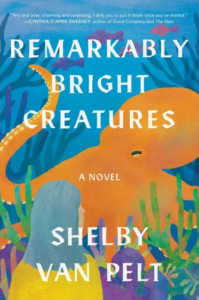 Remarkably Bright Creatures, by Shelby Van Pelt, surprised me with its charming characterizations, implausible interspecies relationships and healing connections.
Remarkably Bright Creatures, by Shelby Van Pelt, surprised me with its charming characterizations, implausible interspecies relationships and healing connections.
Tova Sullivan, the main character, lost her son, Eric, years ago when he was just 18, and she was recently widowed at the age of 70. Facing an unknown future, she copes with her loneliness by staying busy at her night job cleaning the local aquarium, purposefully performing her daily duties “in the right way.” Unwelcome interruptions to her regular routines create unexpected opportunities for change. But can she open to the possibilities they might offer?
Van Pelt sensitively attends to the experience of each of four characters as they seek to understand and find some resolution to their grief. Tova’s quietly painful reflections about her lost son. Cameron, a misfit soul who comes to this small seaside town searching for the father who abandoned him 30 years ago. Ethan, the local music-loving grocer burned in his youth by love lost. Marcellus, the 60-pound octopus who muses on his “end of days,” adding a humorous, magical realism to the mix.
The story centers on a mystery, but it was the relationships between the four characters that captured my heart. Watching as each of them seeks answers to the questions that will shape their next steps forward. Will Tova stay in the house she loves or move to a retirement home? Will Cameron find a way to take on the personal responsibility of adulthood? Will Ethan create more meaningful connections than those of local gossip? Will Marcellus remain a captive in the aquarium?
The relationships that develop between the four of them support the possibility of the opening of new doors and of resolving their losses. As a therapist, this beautifully told story speaks to me about the important aspects of human development that are present in each of life’s stages. For example, the challenges that aging presents, the unending process of grief, and the healing power of relationships- even those that are unexpected and imperfect. It reminds us that anyone – the young folks and the elderly – can learn new ways of making meaning in life, creating and engaging in their preferred pathways.
